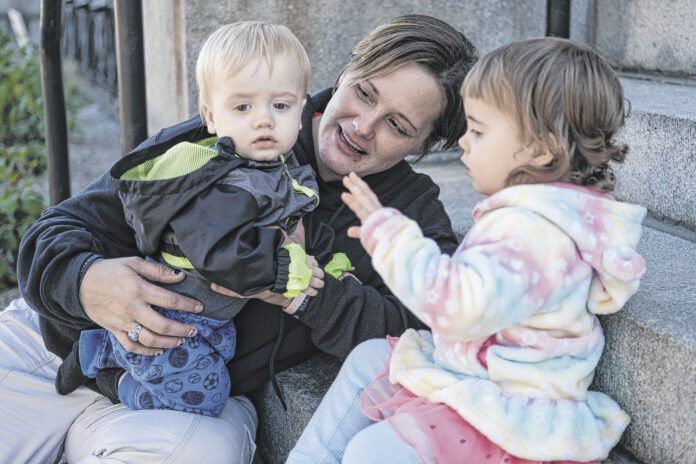
On the day that state officials took her newborn baby away, Kimberly Tungate knew something had to change.
It was October 2020 and the 34-year-old native of North Vernon had just given birth to her son Gavin at Columbus Regional Hospital. But the joy and excitement of welcoming a new baby into the world quickly turned to despair, she said.
State health officials wouldn’t let her take the baby home, Tungate said. In fact, she wasn’t even allowed to see him.
“They pretty much took him from me right there and put him straight into foster care,” she said.
Tungate had been struggling with methamphetamine addiction for years and said she had not been in compliance with orders from the Indiana Department of Child Services.
She had recently lost a 3-year-old child to adoption. Three of her other children — all under the age of 12 — who were staying with her mother at the time, were also placed in foster care, she said.
In early November, Tungate was called down to an Indiana Department of Child Services office, where she was allowed to see her newborn baby for 15 to 20 minutes, she said.
She feared that was she was saying goodbye to him for the last time.
“It was very highly likely I’d never see any of (my children) again if I didn’t get it together,” Tungate said. “The very next morning I went to treatment.”
Tungate would become one of the first women to walk through the doors of a new addiction recovery center for pregnant women and new mothers in downtown Columbus.
The Fresh Start Recovery Center, 703 Washington St., had been open for about a month when Tungate moved in on Nov. 2.
The 22,500-square-foot limestone building, which used to be a post office, was purchased by Volunteers of America in 2018 with the help of the Indiana Housing and Community Development Authority, which financed the $875,000 purchase as part of a $1.2 million loan that also paid for renovation costs.
An additional $200,000 in funding was provided by the Columbus Regional Health Foundation, while program services are funded by the Department of Child Services.
But soon after the recovery center opened its doors in early October 2020, staff saw that Tungate was just one of many younger mothers in the Columbus area in dire need of help.
The center, which recently celebrated its first year of operations, has so far seen higher-than-anticipated demand, said program director Hillary England.
Over the first year, the recovery center served 112 women with 60 children in the Bartholomew County area, England said. Three residents gave birth to children while in treatment.
“Honestly, (demand) was higher than I expected,” England said. “The first year, you never know what’s going to happen. I’m glad that we could help so many people, but yeah, it was harder than I expected.”
Currently, 12 women and six children are living at the recovery center, England said. The center normally can house up to 25 women but maximum capacity has been temporarily reduced to 15 due to the pandemic.
For Tungate, the first week of treatment was “pretty rough,” particularly quitting a drug she had been using for the better part of two decades, as well as getting used to a structured life.
It also was hard to cut ties with people from the past, particularly some family members.
“One of the hardest things I have to deal with is that I had to cut ties with some people who I feel like were very close to me,” Tungate said. “But I just can’t risk messing up what I’m doing in my life. So I have to love them from afar.”
Tungate said she had first tried methamphetamine when she was 15.
At the time, one of her friends had met “this boy” who was “hardcore into methamphetamine,” she said. Shortly after that, her friend started doing meth and introduced Tungate to the drug.
“I fell in love with it,” she said.
Tungate said she wound up using “excessive amounts” of the drug, at times more than once per day. State officials told her on numerous occasions that she had so much of the drug in her system that they were surprised she could even walk.
“The amount of methamphetamine that was in my system was more than a lethal dose, Tungate said. “And that’s the dose of methamphetamine that I was taking on a daily basis, more than once a day.”
But after the first week of treatment, the recovery center started to feel like home, Tungate said. She said she grew close to her therapist and other staff, who helped her get Social Security cards, an ID and helped set up dental appointments, among other things.
As Tungate progressed through the program, she was allowed to visit her children again.
“The most rewarding thing is seeing children reunited with their moms, the moms doing better and doing what they need to do to make their kids happy,” England said.
The treatment program has two phases for a total of 84 days. England said 83% of residents “found success in the second phase.”
In January, Tungate graduated from the treatment program. She was set up with an apartment through Thrive Alliance and found work at a Cummins manufacturing facility.
Over the next several months, Tungate was allowed to get home visitations with her children, which eventually progressed to unsupervised visits, she said.
The child services case with her baby, who celebrates his first birthday this week, was closed out, Tungate said. The cases with her other children are progressing but they are already living with her on a trial basis.
Tungate said she wanted to share her story because she wants women in similar situations to know that “recovery is possible,” especially for young mothers who want the “opportunity to get your kids back.”
England, for her part, said she hopes the recovery center can help more people over the next year than during its first year.
“We hope that we can jump our numbers up higher, and I hope that we can just get some outreach out there to let these women know there is help,” England said.
“We can help you,” England added. “This isn’t the end of the road.”




